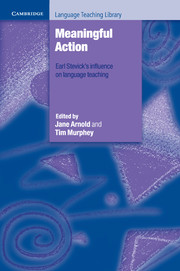Book contents
- Frontmatter
- Contents
- List of contributors
- Acknowledgements
- Preface
- Introduction
- Part A Meaning-making inside and between the people in the classroom
- Part B Meaningful classroom activity
- Part C Frameworks for meaningful language learning
- Epilogue: A way with words – perspectives on the contributions and influence of Earl W. Stevick
- Appendix: Words of tribute to Earl Stevick
- Index
1 - Inside, between and beyond: agency and identity inlanguage learning
Published online by Cambridge University Press: 15 November 2023
- Frontmatter
- Contents
- List of contributors
- Acknowledgements
- Preface
- Introduction
- Part A Meaning-making inside and between the people in the classroom
- Part B Meaningful classroom activity
- Part C Frameworks for meaningful language learning
- Epilogue: A way with words – perspectives on the contributions and influence of Earl W. Stevick
- Appendix: Words of tribute to Earl Stevick
- Index
Summary
Introduction
One of Earl Stevick's enduring contributions to the field of language education is the insight that ‘success depends less on materials, techniques, and linguistic analyses, and more on what goes on inside and between people in the classroom’ (Stevick 1980: 44).1 An important part of what does or does not go on has to do with relevance, in other words, the connection between something on the external dimension of human experience with something on the internal dimension of the student's appreciation of self (Stevick 1980: 119). Relevance breaks down if what happens does not make sense in terms of the learner's past, present or future realities (p. 118). The affairs of the classroom are thus firmly connected to the world beyond.
Conceptualizing the language learner in this way suggests not only a focus on the person, but a focus on that person as a ‘person-in-the-world’ (Lave and Wenger 1991: 5). It also encompasses matters of agency and identity (Miller 2010). In what follows, I explore this with reference to interaction in an adult immigrant language classroom along with connections to realities beyond it.
Agency
Second language acquisition researchers working within a sociocultural paradigm view the interrelated notions of agency, self and identity as being of importance in the learning of additional languages (van Lier 2010: ix). From a sociocultural perspective, agency is viewed as a person's capacity to act within the possibilities afforded by the social structures in which he or she is situated (van Lier 2008; Miller 2010). More specifically, as a context-related capacity:
Agency refers to people's ability to make choices, take control, self-regulate, and thereby pursue their goals as individuals, leading, potentially, to personal or social transformation … A sense of agency enables people to imagine, take up, and perform new roles or identities (including those of proficient L2 speaker or multilingual) and to take concrete actions in pursuit of their goals. Agency can also enable people to actively resist certain behaviors, practices, or positionings, sometimes leading to oppositional stances and behaviors leading to other identities.
(Duff 2012: 417)- Type
- Chapter
- Information
- Meaningful ActionEarl Stevick's Influence on Language Teaching, pp. 11 - 28Publisher: Cambridge University PressPrint publication year: 2013



